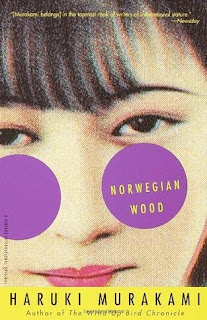Norwegian Wood
When I was young, I loved Judy Blume books - Are You There God, It's Me Margaret?, Deenie, Tales of a Fourth Grade Nothing, Blubber, and so on. Later, as a sixth-grader, I was in a bookstore and saw a book she wrote that I'd heard absolutely nothing about. I didn't even know it existed. Assuming it was another glorious, innocent, kid-friendly tale that I would love, I excitedly handed it to my mom to purchase for me, and in her equal lack of knowledge about its contents, I became the proud owner of ... Forever. For any of you who ever read that book, let me assure you it was NOT kid-friendly, and was rather a literary and occasionally graphic crash course in a girl losing her virginity with her first love. Needless to say I was shocked by what I was reading, but then pretty much showed all the dog-eared "dirty" parts to all my friends at school, as we giggled amongst ourselves. It still had her charm as an author - I was just a little young to be reading it.
Why do I bring this up? Here's why. Sometimes you pick a book blindly, knowing nothing of the storyline, and solely basing your decision on the goodwill you have towards the author or their reputation. I'd heard of Haruki Murakami but had never read any of his works and this book happened to be an available e-book at my library. Unlike my shockingly revelatory, but overall positive experience with Blume's Forever, I walk away from this one feeling just ... dirty. I truly wish this hadn't been my first experience with reading his works because, honestly, it makes me want to steer clear of his other books. It's a pity, because starting the book I was immediately drawn in by his often poetically beautiful use of language. I can see that he's a skilled writer, is adept at creating a mood, and given other subject matter, I'd imagine I might even enjoy other works of his. In the end, this story would have been elevated so much by just developing the character personalities and emotional foundations for their relationships.
The story is told in the first person narrative of a young man named Toru, who during the course of the book is torn between his love for the tragically flawed Naoko, and the highly spirited, often obnoxious Midori. Toss into the stew the kind, but also deeply flawed Reiko, Toru's narcissistic friend Nagasawa, and a host of other less visible, but also damaged characters and you get: he's a mess, they're a mess, everyone's a messy mess. There's not one truly likeable major character in the book, and by the end, which in theory should have been a happy one, I just wanted the whole ride to be over. Unfortunately, with this love story, it just felt like Murakami was finding excuses to write semi-frequent, highly descriptive, anatomically detailed, non-sensical to the plot, spin the roulette wheel to find your partner, depictions of sex. Toru’s “manhood” in this book gets so much attention it could be its own character, and, apparently, it’s irresistible to the women around him, despite his hum-drum personality. The worst of the gratuitous stuff is Reiko's backstory with her sociopathically precocious young piano student, which I'll spare you the gory details of, other than to say there's no good reason for that to exist in literature. For those still interested in the book after my less-than-glowing review, I want to offer a trigger warning that themes of loneliness, depression, suicide, mental illness, parental death, and unfulfilled love permeate the pages, so if you’re sensitive to those topics, avoid this book. I know the book is highly rated, but it’s just not for me.
★★

.jpg)

Comments
Post a Comment